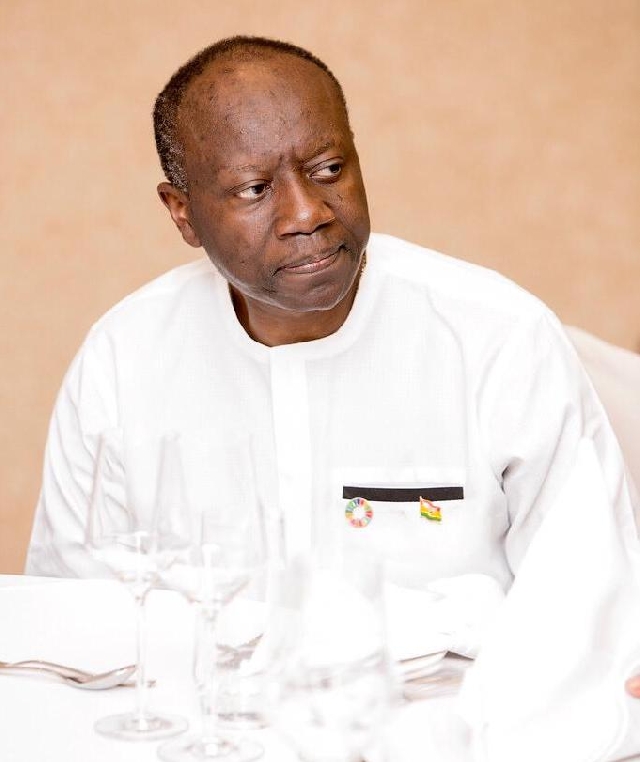H1-2021 records US$837.5m trade surplus, US$11bn Gross Int’l Reserves
 Ken Ofori-Atta
Ken Ofori-Atta
The provisional Trade Balance for first half of the year (January to June) recorded a surplus of US$837.5 million (1.2% of GDP), lower than the surplus of US$1,005.5 million (1.5% of GDP) recorded in the corresponding period of last year, Finance Minister Ken Ofori-Atta has said.
The lower trade balance was attributed to higher imports demand which outweighed export earnings, he told parliament when he presented the mid-year budget review on Thursday, 29 July 2021.
The total value of merchandise exports recorded for the first six months was US$7,593.2 million, which represented 2.7 per cent annual growth, he reported.
The increase in exports earnings during the period was mainly on the back of a rally in the prices of key export commodities, Mr Ofori-Atta explained.
At the same time, imports rose by 5.7 per cent to US$6,755.6 million, reflecting a pick-up in economic activity following the easing of COVID-19 restrictions, he noted.
Both non-oil imports and oil imports contributed to the increased demand for imports, the minister noted.
The Current Account in Q2-2021 recorded a deficit of US$926.1 million (1.3% of GDP) compared to a deficit of US$548.2 million (0.8% of GDP) in the same period in 2020, mainly on account of declining trade surplus and increased investment income outflows.
“Private individual transfers remained resilient with net inflow of US$1.6 billion in the first half of the year, despite the uncertain global environment”, Mr Ofori-Atta noted.
However, despite the surplus in the trade account, the current account recorded a deficit mainly because of higher outflows in the services and income accounts, he announced.
Also, the Capital and Financial Account recorded an inflow of US$3,333.2 million in Q2-2021 compared with US$1,613.9 million in Q2-2020, driven by higher portfolio and foreign direct investments inflows.
The lower current account deficit and higher inflows into the capital and financial accounts resulted in an overall balance of payments surplus of US$2,369.7 million compared to a surplus of US$1,009.9 million in the corresponding period of 2020, he contrasted.
As of the end of June 2021, the minister revealed that the country’s Gross International Reserves (GIR) stood at US$11,026.9 million from a stock position of US$8,624.4 million at the end of December 2020.
He said this was sufficient to provide a cover of 5.0 months for imports of goods and services compared with 4.3 and 4.0 months of import cover recorded at end-June and end-December 2020, respectively.
In the outlook, the thrust of external sector policy will be to build sufficient reserves to provide at least four months cover for imports of goods and services and to support the forex market to smoothen out fluctuations, he said.
Improvement in the trade account and strong remittances inflows, together with portfolio inflows occasioned by continued access to the international financial market, will be required to secure a strong external position, Mr Ofori-Atta added.
Gradual recovery in global output, driven mainly by progress with mass vaccinations, will support commodity prices, he added.
“As a result, we expect exports growth to be strong and underpin the improvement in the trade account. This is in spite of the revival of imports occasioned by the projected recovery in economic activity. We expect the current account deficit to remain stable in the medium-term”.
“This, together with improvements in the financial account will help secure a strong external position to cushion the economy against shocks”.
Source: Classfmonline.com
Trending Business

Government, Afreximbank resolve issues over US$750m facility
10:17
Muntaka Entrepreneurship Hub trains over 100 women in Asawase
14:16
Ghana Gold Board rakes in over $10bn ahead of target
09:56
GEXIM faces GHS1.5bn credit exposure as NPLs near 30% — CEO
09:36
Six Degrees delivers immersive experiential production at Kweku Smoke’s revival concert
10:37
GIPC highlights govt’s commitment to retail sector transformation at GUTA conference
03:01
Lower-Volta Small-Scale Miners & Farmers to host international livestock market
00:43
Nigeria's commercial dispute involving Ghanaian firm raises bilateral trade concerns-UK Certified Customer Communication expert warns
21:31



